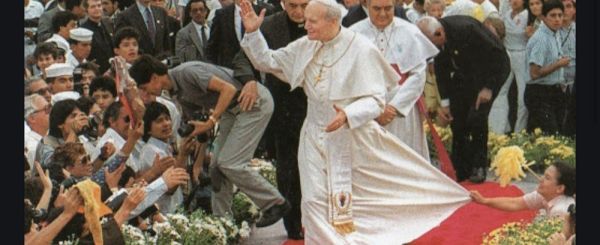Psalm 48:14-21 - Human wealth does not save
1. As it gradually develops, the Liturgy of Vespers presents to us the sapiential Psalm 49[48], whose second part has just been proclaimed (cf. vv. 14-21). This section of the Psalm, like the previous part (cf. vv. 1-13) on which we have already reflected, also condemns the illusion to which idolizing riches gives rise. This is one of humanity's constant temptations: clinging to money as though it were endowed with some invincible power, we allude ourselves that we can even "buy off death" and keep it at bay.
2. In reality, death bursts in with its ability to demolish every illusion, sweeping away every obstacle and humbling our pride (cf. v. 14), ushering into the next world rich and poor, sovereigns and subjects, foolish and wise alike. The Psalmist has sketched a vivid image, showing death as a shepherd firmly driving his flock of corruptible creatures (cf. v. 15). Thus, Psalm 49[48] offers us a realistic and stern meditation on death, the unavoidable and fundamental destination of human existence.
We often seek to ignore this reality in every possible way, distancing the very thought of it from our horizons. This effort, however, apart from being useless, is also inappropriate. Reflection on death is in fact beneficial because it relativizes all the secondary realities that we have unfortunately absolutized, namely, riches, success and power. Consequently, Sirach, an Old Testament sage, warns us: "In all you do, remember the end of your life, and then you will never sin" (7: 36).
3. However, here comes a crucial turning point in our Psalm. If money cannot "ransom" us from death (cf. Ps 49[48]: 8-9), yet there is One who can save us from that dark, traumatic shadow on the horizon. In fact, the Psalmist says: "God will ransom me from death and take my soul to himself" (v. 16).
Thus, a horizon of hope and immortality unfolds before the just. The response to the question asked in the first part of the Psalm, "why should I fear", (v. 6) is: "do not fear when a man grows rich" (v. 17).
4. When the just person, poor and humiliated in history, reaches the ultimate boundary of life, he has no possessions, he has nothing to pay as a "ransom" to stave off death and remove himself from its icy embrace. Here is the great surprise: God himself pays the ransom and snatches his faithful from the hands of death, for he is the only One who can conquer death that human creatures cannot escape.
The Psalmist therefore invites us "not to fear" nor to envy the rich who grow ever more arrogant in their glory (cf. ibid.) since, when death comes, they will be stripped of everything and unable to take with them either gold or silver, fame or success (cf. vv. 18-19). The faithful, instead, will not be abandoned by the Lord, who will point out to him "the path of life, the fullness of joy in your presence, at your right hand happiness for ever" (cf. Ps 16[15]: 11)
5. And then, at the conclusion of the sapiential meditation on Psalm 49[48], we will be able to apply the words of Jesus which describe to us the true treasure that challenges death: "Do not lay up for yourselves treasures on earth, where moth and rust consume and where thieves break in and steal, but lay up for yourselves treasures in heaven, where neither moth nor rust consumes and where thieves do not break in and steal. For where your treasure is, there will your heart be also" (Mt 6: 19-21).
6. As a corollary to Christ's words, in his Comment on Psalm 49[48], St Ambrose reasserts firmly and clearly the inconsistency of riches: "They are all perishable and go faster than they came. A treasure of this kind is but a dream. On waking, it has disappeared, for the person who rids himself of the intoxication of this world and acquires the sobriety of virtue will despise all these things and attach no importance whatsoever to money" (Commento a Dodici Salmi, n. 23: SAEMO, VIII, Milan-Rome, 1980, p. 275).
7. The Bishop of Milan therefore invites us not to be ingenuously attracted by human wealth and glory: "Do not fear, even when you see the magnification of some powerful family's glory! Know how to look deeply, with attention, and it will appear empty to you unless it contains a crumb of the fullness of faith". Indeed, before Christ's coming, man was decadent and empty: "The ruinous fall of that ancient Adam emptied us, but Christ's grace has filled us. He emptied himself to fill us and make the fullness of virtue dwell in human flesh". St Ambrose concludes that for this very reason, we can now exclaim with St John, "And from his fullness have we all received, grace upon grace" (Jn 1: 16) (cf. ibid.).
[Pope John Paul II, General Audience 27 October 2004]












